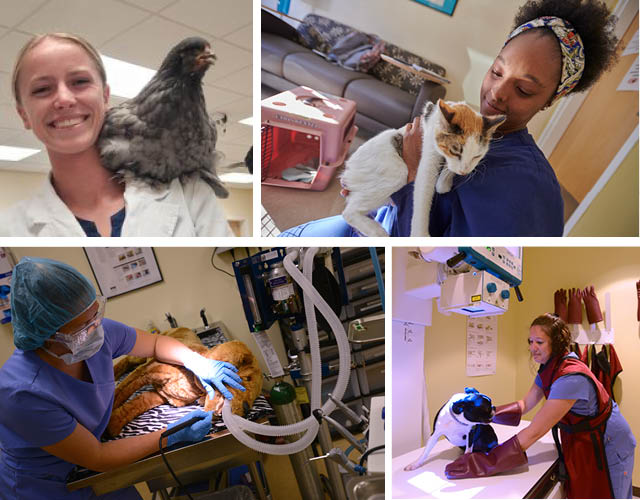 According to the National Association of Veterinary Technicians website, “Veterinary Technicians are integral players on the veterinary healthcare team. They are on the front lines, compassionately working with clients whose beloved animals need care. They work tirelessly in exam rooms, labs and operating rooms, using their vast technical and scientific knowledge to treat and care for every animal species. Their broad professional and personal skills allow veterinarians to work more efficiently and effectively.” Credentialed Veterinary Technicians contribute to public health and work in a variety of roles within animal and human healthcare.
According to the National Association of Veterinary Technicians website, “Veterinary Technicians are integral players on the veterinary healthcare team. They are on the front lines, compassionately working with clients whose beloved animals need care. They work tirelessly in exam rooms, labs and operating rooms, using their vast technical and scientific knowledge to treat and care for every animal species. Their broad professional and personal skills allow veterinarians to work more efficiently and effectively.” Credentialed Veterinary Technicians contribute to public health and work in a variety of roles within animal and human healthcare.
A seasoned veterinary technician herself, Sarah Meyer CVT, Assistant Professor and program director of the PSC Veterinary Technology program affirmed, “[Our program] is basically all the programs on the Allied Health campus wrapped up into one career field: radiology, anesthesia, pharmacology, ultrasound, and surgical nursing- all of the nursing of every species of animal except for human. We do all of that, so we have a vast knowledge of different disciplines.”
A reflection of the hard work that goes into what these students learn and know how to do, the PSC program has a three-year pass rate that is higher than the national average. “To maintain accreditation, we have to maintain a 54% three-year pass rate. I take all the graduates who have taken and passed the national board exam the first time, and that is what we report to the accrediting body. We are always well above: 92% in 2023 in an individual cohort, and in 2024, we had 90%.”
These high scores may be a result of a few things that set Pensacola State College apart from other programs, according to the vet tech program director, including smaller class sizes, a brick-and-mortar program and vested instructors. “If students have ‘point of service’ with instructors in a brick-and-mortar, they can ask a question and have it answered almost immediately whereas student questions asked in a distance learning program may be 24 to 48 hours or longer to get those questions answered.” She also asserts that the program has instructors who are vested. “We don’t have a high turn-over. We have instructors who have been here since the inception of the program, so there is consistency with the teaching faculty.”
The College’s Veterinary Technology program clearly works to prepare students for the future in solid positions and companies. All one must do is to look at the impressive graduate employer list the program maintains to know that students are experiencing success in great places: Christina Zaccardi at Auburn University Veterinary Teaching Hospital in the Emergency Critical Care/Intensive Care Unit and Jamie Bowling at Coastal Sunrise Animal Hospital in Pensacola, for example. Others are working in prestigious places like Siemens research facility in Ohio, Gulf World Marine Park in Panama City Beach, and a rare breed corporate hospital in Maine, just to name a small few. “I’m a credentialed technician, and I’ve been practicing for two decades, so I’m always really excited to teach new folks; they have so many more opportunities than I did when I graduated. I’m just very optimistic for their future in veterinary nursing.”
 PirateQ
PirateQ 
